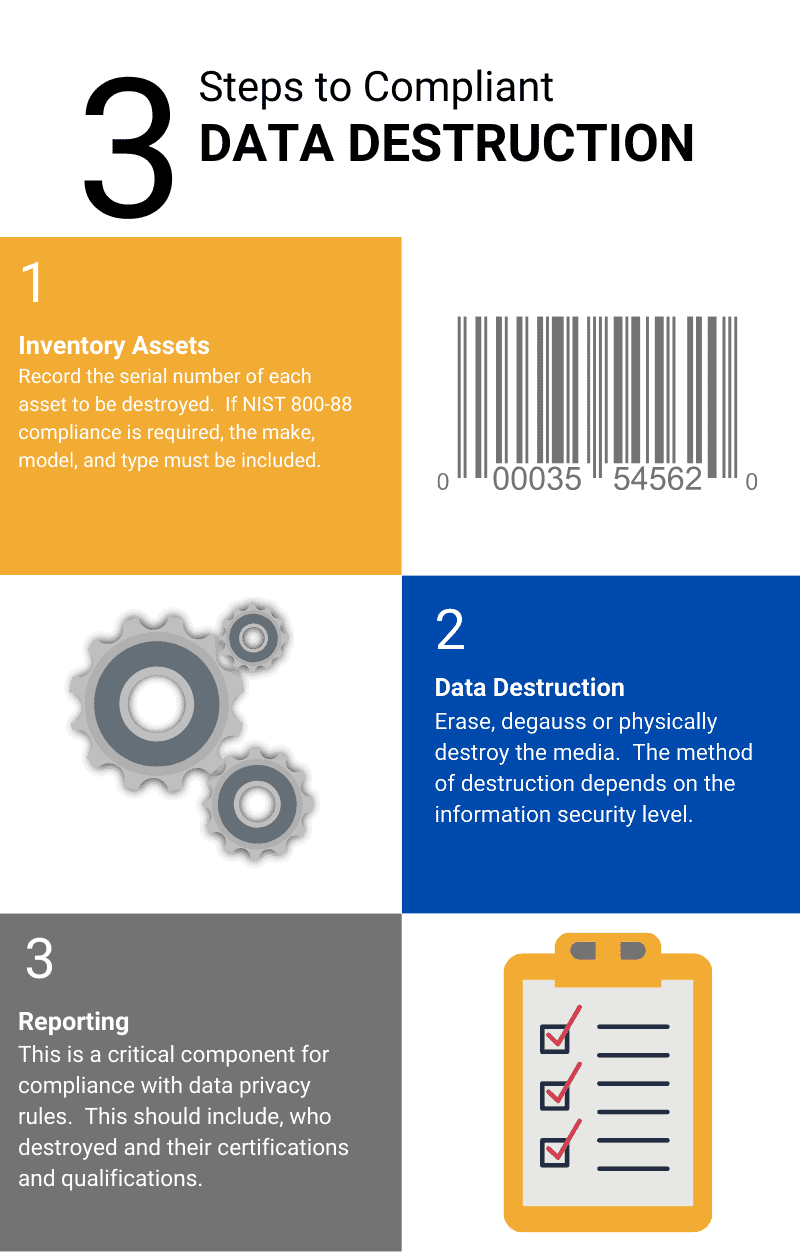Enhancing Cyber Security through Advanced Data Destruction Techniques
Enhancing Cyber Security through Advanced Data Destruction Techniques
Blog Article
Exploring the Relevance of Information Devastation in the Context of Computer Protection Solutions and Protecting Confidential Information
In a period where data violations are increasingly usual, the relevance of reliable information destruction can not be overemphasized. Organizations has to adopt rigorous procedures to ensure that delicate information is not only safeguarded throughout its lifecycle however likewise decisively removed when no much longer necessary. The techniques used for data removal, coupled with compliance to lawful criteria, play a pivotal duty in maintaining confidentiality and trust. The effects of these practices extend past simple compliance, affecting a company's track record and operational honesty in the electronic market. What methods can organizations execute to boost their information devastation methods?
Understanding Information Destruction
Information damage is an essential part of computer safety that involves the irreversible elimination of data from storage devices to avoid unapproved accessibility and prospective data violations. In a progressively electronic landscape, organizations face increased risks connected with delicate details being poorly accessed or made use of. Reliable information destruction safeguards versus these dangers, guaranteeing that private dataâEUR" such as consumer details, copyright, and economic recordsâEUR" can not be recouped after disposal.
Comprehending the value of data damage expands beyond plain compliance with legal and regulatory frameworks; it is crucial for preserving business honesty and depend on. When information is incorrectly taken care of or inadequately damaged, the consequences can be severe, consisting of financial loss, reputational damages, and legal responsibilities.

Approaches of Data Obliteration

One common technique is data cleaning, which involves overwriting existing information with arbitrary patterns multiple times. This method makes the original data irretrievable, making it a popular choice for organizations seeking to safeguard secret information.
Another approach is degaussing, which makes use of an effective magnetic field to interrupt the magnetic domains on storage devices, effectively erasing the data. This technique is especially effective for magnetic media yet is not appropriate to solid-state drives.
Physical devastation is another robust approach, crushing or involving the shredding of storage space tools. This technique assurances that data recovery is essentially impossible, making it perfect for extremely sensitive information.
Lastly, file encryption can serve as a corresponding technique to information removal. By securing data prior to deletion, companies can add an added layer of safety and security, ensuring that also if residues are recuperated, they continue to be inaccessible without the decryption secret. Each technique must be selected based upon the degree of data level of sensitivity and the specific protection demands of the organization.
Legal Compliance and Information Security
Organizations need to browse a complicated landscape of legal demands associated with information safety and security, especially after carrying out techniques of data eradication. Various guidelines, such as the General Information Security Guideline (GDPR) and the Wellness Insurance Mobility and Accountability Act (HIPAA), enforce stringent standards on just how organizations additional hints need to take care of and dispose of delicate information. Failure to abide by these laws can cause substantial legal repercussions, including considerable fines and reputational damage.
Information damage processes should be thoroughly recorded to show conformity with suitable laws and criteria. This documents not only functions as evidence of adherence to legal commitments yet likewise illustrates a dedication to protecting delicate info. Organizations should additionally develop clear policies concerning data retention and devastation timelines, guaranteeing that data is not held longer than required.

Additionally, regular audits and analyses of data destruction techniques are vital to preserve conformity and adapt to developing lawful structures (data destruction). By proactively resolving lawful requirements, companies can mitigate dangers connected with information violations and show their dedication to data protection. Eventually, prioritizing legal compliance in data destruction processes is not just a regulatory obligation, yet an essential aspect of a durable information safety and security strategy
Effect On Service Credibility
The online reputation of a service can be considerably impacted by its technique to data destruction and monitoring. In today's digital landscape, where information breaches can take place anytime, the failure to correctly get rid of delicate info can bring about serious effects. Organizations that inadequately take care of data devastation risk revealing confidential client details, which not only breaks personal privacy laws however additionally erodes depend on amongst clients and stakeholders.
A damaged online reputation can result in decreased customer loyalty, as clients come to be reluctant to involve with an organization that has shown carelessness in safeguarding their data. Furthermore, adverse attention surrounding a data breach can have a lasting impact, as prospective consumers may be discouraged by the viewed absence of security. This can cause a straight decrease in profits and market share.
Furthermore, services that focus on data damage as part of their safety and security technique can improve their credibility by showcasing their dedication to guarding delicate details. By taking on rigid information management practices, companies can not just alleviate dangers however likewise position themselves as credible entities in their respective industries, thereby enhancing their overall brand name photo.

Finest Practices for Secure Disposal
Carrying out best techniques for secure disposal of data is important for mitigating risks related visit our website to data breaches and making certain compliance with privacy guidelines. Organizations ought to embrace an extensive information disposal policy that lays out procedures for both physical and digital data damage.
For physical information storage space devices, such as disk drives, shredding or degaussing is suggested to stop data recuperation. Furthermore, companies ought to preserve a chain of protection documentation throughout the disposal procedure, guaranteeing liability and traceability of disposed items.
For electronic information, using software program that follows market criteria for data wiping is critical. This software must overwrite existing information numerous times, making recovery essentially difficult. It is likewise essential to validate the efficiency of the information destruction process through audits or third-party assessments.
Training staff members on secure disposal practices adds another layer of safety, as human mistake can often result in data direct exposure. Regularly upgrading and assessing disposal plans ensures alignment with developing policies and technological improvements. By applying these ideal techniques, companies can significantly reduce the risk of unauthorized data access and boost their total information defense approach.
Verdict
In verdict, information damage is an essential element of computer safety and security services that ensures the protection of secret information from unapproved gain access to. Executing effective methods of information obliteration, sticking to legal compliance, and identifying the effect on company online reputation are essential components of a detailed data security strategy. By adopting best techniques for protected disposal, organizations can cultivate depend on with customers and safeguard delicate data, ultimately adding to a much more protected electronic landscape.
In an age where information breaches are significantly typical, the significance of reliable data devastation can not be overstated.Information damage is a crucial part of computer protection that includes the read this irreversible elimination of information from storage tools to avoid unapproved access and possible data breaches. Organizations needs to likewise develop clear plans relating to information retention and damage timelines, making certain that data is not held longer than needed.
By proactively addressing legal needs, organizations can alleviate risks connected with information violations and demonstrate their commitment to information security (data destruction). Eventually, focusing on lawful compliance in data damage procedures is not just a regulative obligation, yet an essential element of a durable information security technique
Report this page